Character
According to Williams, characters in a melodrama seem to be psychically based on, and anthropomorphic embodiments of the Manichaean split between good and evil (77). If it is not clear by now that this is not true of Heartless City, let me just drive the point home by looking at some of the main characters in the series before looking at the presentation of the victim-hero’s perspective in Heartless City.
The first line of complication comes from how, as a whole, the series seems to create more compelling ‘bad guys’ than ‘good guys.’ From the Madame Jin-sook, to the mid-level drug cartel enforcer Safari Moon, to Baksa Aduel’s loyal and decidedly amoral right-hand man, Hyun-soo – these are characters who are given more air time on the show and whose motivations are clearly delineated. They are given flashback sequences and developed as rounded characters. Conversely, we hardly know anything about Hyeong-min’s past nor any of the police officers in the Special Branch taskforce. Thus the diegesis of the film and the formal structure seems to encourage audiences to identify with the ‘bad guys’ more than the ‘good guys.’
Even main antagonists like Chairman Cho, Commissioner Min, the corrupt Senator and Head of Prosecutors remind Baksa Aduel that even if he removes them, it doesn’t remove the seat in the criminal organization they occupy and that ultimately, everyone’s replaceable. I suppose that’s why the series is called Heartless/Cruel City, it’s because the source of evil is not the individual person but something larger, something systemic, and this runs contrary to Manichaean characterization of characters. Yet, at the same time fulfills the function of Manichaean characters, which is to portray virtuous suffering so that virtue may be recognized and acknowledged (66).
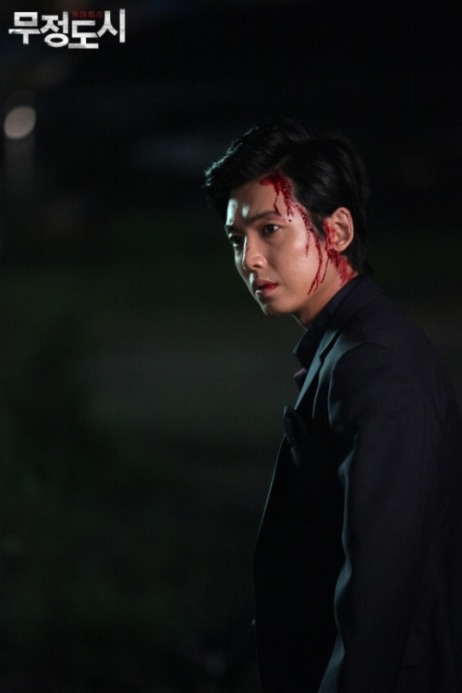
I guess the most compelling reason why the use of Manichaean characterization is not a major feature in Heartless City is due to the main character himself – Baksa Aduel (Doctor’s Son) a.k.a. Jung Shi-hyun. When it comes to the treatment of the victim-hero, Williams says that emphasis is given to the character’s point of view so that we may better empathise with the virtue of the suffering victim-hero (66). This, however, is atypical of Heartless City. Instead, the character appears opaque and we are seldom shown what he is really thinking. This is especially true of the first part of the series and instead of alienating the audience, the lack of information and screen time given to Baksa Aduel draws audiences further in.
Just to share a little bit about my own reaction to this k-drama, the first episode was fast losing my attention and interest until this scene about 30 minutes into the episode where Baksa Aduel has to explain to Scale why he still hasn’t handed over the drug money. Scale greets him by throwing a whiskey glass at him, which he dodges effortlessly. Scale dares him to dodge again and breaks a second glass over his head as he stands there unflinchingly with a trickle of blood rolling down the side of his face.
I wish I could show you a clip of this because my description of the scene really doesn’t do it justice.
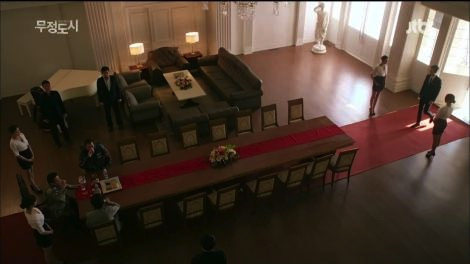
Perhaps it’s the way the energy in the scene goes from 0 to 100 in just a couple of seconds. The stillness in the dining room is almost tableau-like in a pulled out establishing shot, the tense atmosphere set by the ominous soundtrack, Baksa’s slow traversing of the large room captured in a tracking shot, then suddenly a quick cut to Scale flinging of the glass and another cut to Baksa stepping out of the way as the glass shatters against the wall.
Suddenly, I was paying attention again. And when he took the abuse from Scale so coolly, I wanted to know more about what made this character tick.
It’s almost as if the character’s tight, almost absurd control of his own emotions becomes the form of excess one comes to expect in a melodrama. And it’s seen again in this next scene where after having to watch a childhood friend get shot right in front of him, he can’t even visit her grave because she was a cop and to the rest of the world, he is a crime boss.
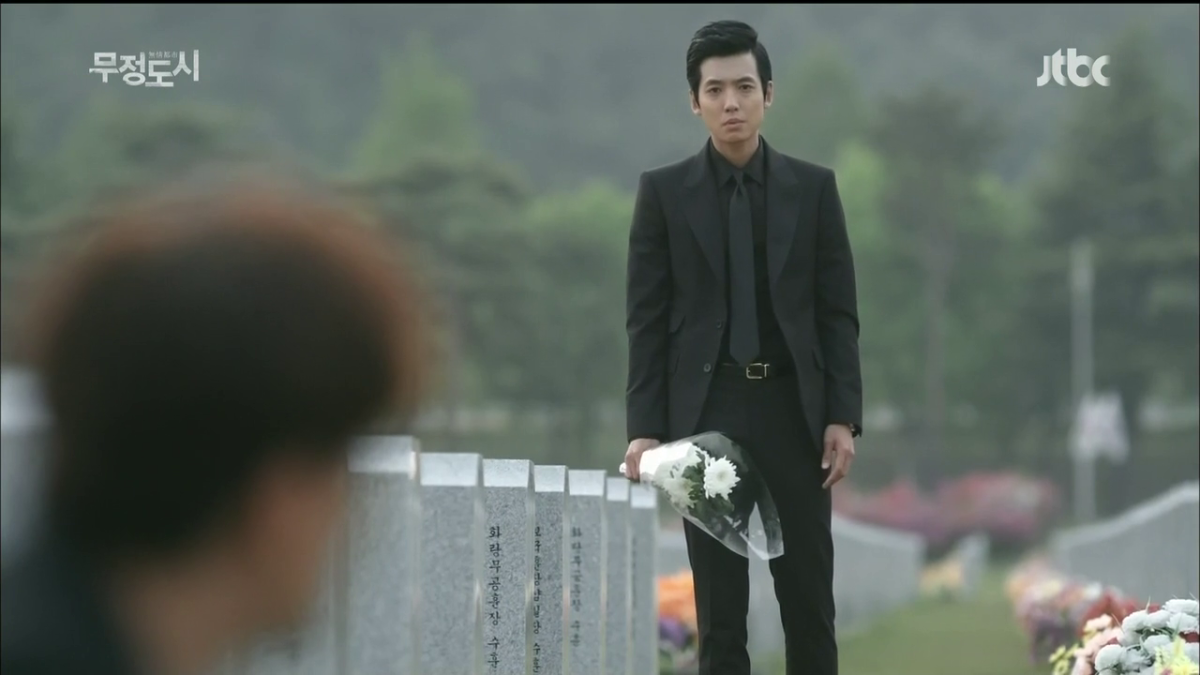
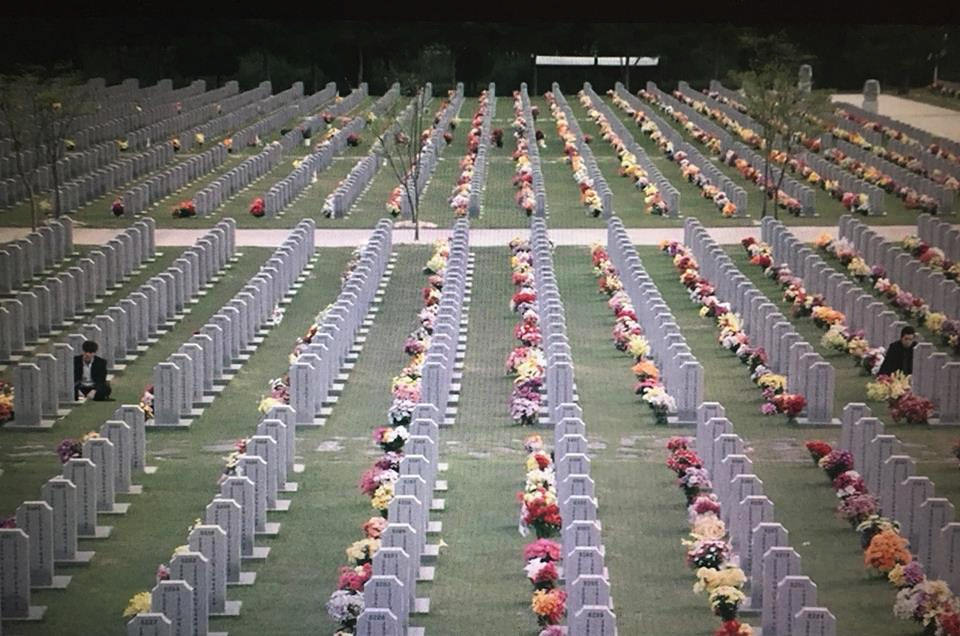
Audience desire to know more about the character aside, you never really get any direct information about who this character is or what his motivations are and the narrative seems to sidestep this by giving you snippets of his past not through his eyes but through Safari’s, Kyung-mil’s, and Commissioner Min’s flashbacks of their shared past.
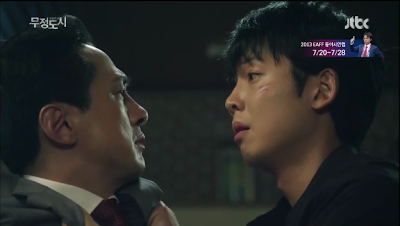
It’s not until much later in the series where another kind of excess in the character of Baksa Aduel begins to come to the fore. The excess of identity. Being both ‘good’ guy as undercover cop and ‘bad’ guy as crime boss and friend to both Jin-sook and Hyun-soo, this excess of identity becomes a flip on the Manichaean characterisation of characters found within melodramas. In the intense scene above, we see the character losing hold of who he is as his handler calls him Shi-hyn and, in a burst of action, he turns around and grabs him by his coat lapels and insists he be called Baksa Aduel instead.
To have both ‘good’ and ‘bad’ embodied in the character by way of this secret identity as undercover cop who has been undercover in excess of 4 years, only serves to make his character motivations even more ambiguous because you start to wonder, as he grows more and more disillusioned with the extent of the corruption (his own handler is one of the key villains), whether he is still acting as an undercover cop first and crime boss, and friend to Jin-sook and Hyun-soo, second.
As a parting shot about this character of ambiguous moral stance, let me leave you with this picture of Baksa Aduel and Hyun-soo looking out over the city as Baksa delivers this classic Übermensch line:
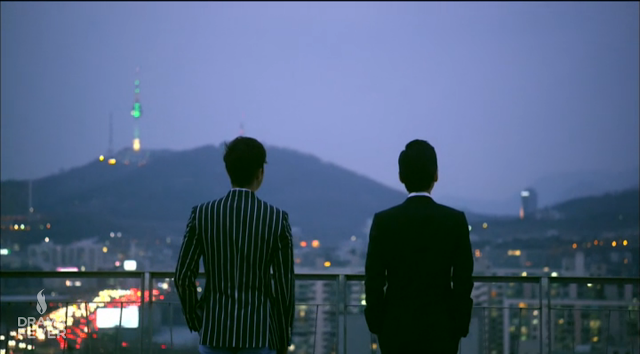
“Soo ah… See those streets? Let’s swallow them.”
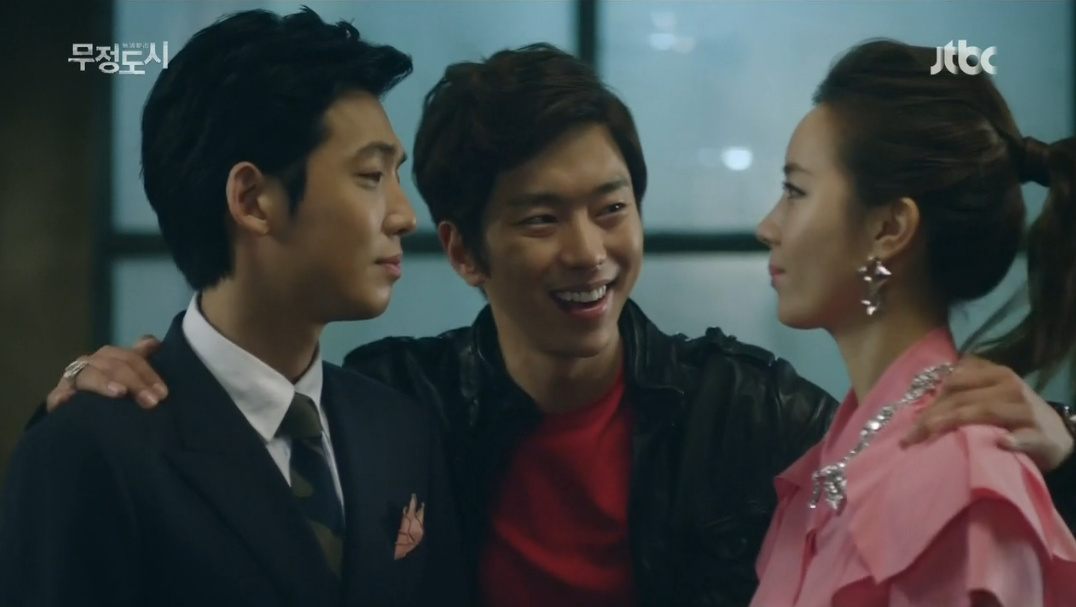
“It’s almost as if the character’s tight, almost absurd control of his own emotions becomes the form of excess one comes to expect in a melodrama.” I think this specific line really is the highlight of this blog because this definitely almost seems an anti-melodrama from Baksa Adeul’s character perspective due to his emotionless nature. However, the very resistance and hidden emotions are made to be filled with the spectators own desire. It’s almost as if the character compels the spectator to fill in the blank emotion Baksa Adeul is portraying. Baksa Adeul’s life is also described through the eyes of others which shows a deliberate intention from the director and writer to make the character like a blank canvas waiting for everyone to put in their own feelings into play.
LikeLiked by 1 person
Osu! I agree 😉
LikeLike